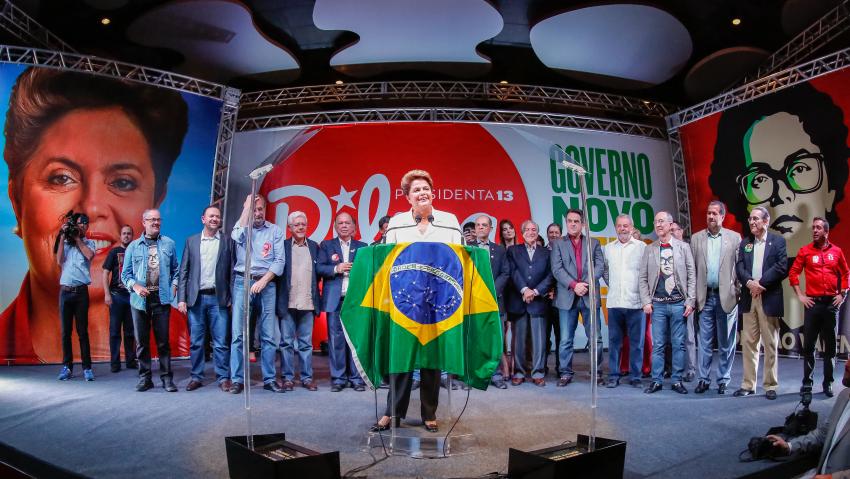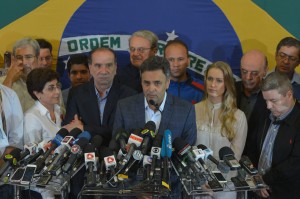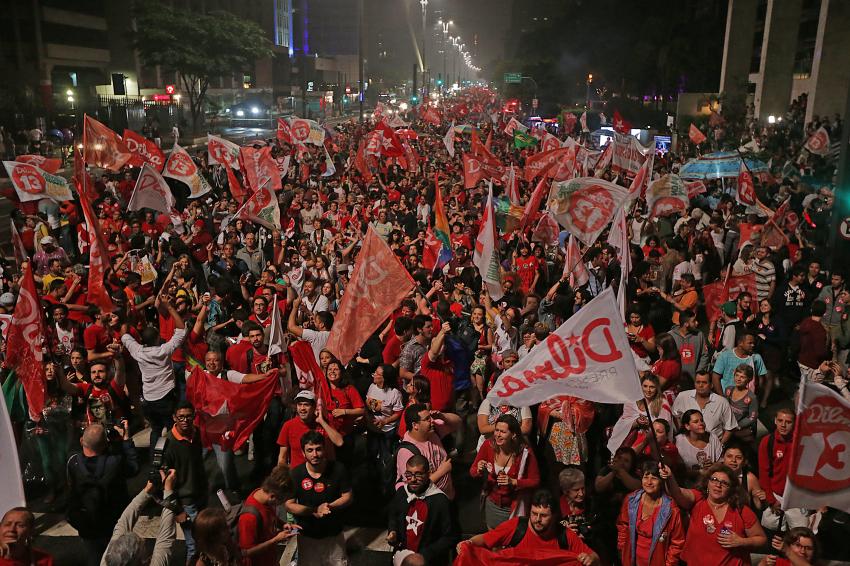
EspañolOn Sunday evening, the Brazilian Superior Electoral Court officially declared President Dilma Rousseff the winner of a highly contested presidential election. Rousseff obtained 51.64 percent of the vote in the final runoff, defeating opposition leader Aécio Neves of the Brazilian Social Democracy Party. This means the Workers’ Party (PT) have secured their fourth consecutive victory for Brazil’s highest office, and will remain in power until at least 2019.
As the campaign slogan “One, two, three, Dilma once again” rang throughout the PT headquarters in San Paulo, Rousseff took the stage on Sunday to celebrate her narrow victory. With a difference of just 3.4 million of votes, out of a total of 142.8 million people eligible to vote, Rousseff reaffirmed her commitment to dialogue and said she does not believe the election has divided the country.
“This president before you is open to dialogue, and this is the first promise I make in my second term,” said the president. Rousseff addressed concerns over the nation’s economy and promised the crowd of supporters in attendance to put the country back on track: “My friends, every election has to be seen as a peaceful and secure form of change for a country. Every election is a form of change, especially for us who live in one of the largest democracies in the world.”
Rousseff won 16 out of the 26 Brazilian states, including Minas Gerais, the second most populous state in the country, and the birthplace of opposition candidate Aécio Neves.

The senator and former governor of his home state called Rousseff to congratulate her and wished her successes in her second term as president. He also thanked the 50 million Brazilians who voted for him in the election.
Although Brazil first adopted electronic voting 18 years ago, this was only the second election under the new biometric identification system. According to local press reports, the biometric system presented fewer challenges for voters in the runoff than in the initial round of voting.
The Economy the Top Priority
Among the various promises Rousseff made during her victory speech, she stressed the need to get rising inflation under control. She also said her administration will seek to enact policies that promote fiscal responsibility and combat corruption.
The economy continues to be a challenge for the ruling party, as the president stares down a recession and declining investment going into next year.
“In order for us to resume economic growth, guaranteeing high levels of employment and ensuring increases in salaries, we will boost economic activity in all sectors, especially in industry,” said Rousseff.
She also promised to continue welfare programs that benefit one fourth of the Brazilian population.
As for political reform, Rousseff affirmed her administration’s “rigorous commitment to fighting corruption and strengthening control mechanisms to put an end to impunity, which is the greatest protector [of corruption].”

Petrobras Scandal Rears Its Head in Final Hours
On Friday, in the final lead-up, around 200 demonstrators assaulted and destroyed the facilities of publisher April Editorial. The attack came in retaliation to one of the publisher’s magazines, Veja, which released a story about Rousseff’s highest-profile corruption scandal.

In a story titled “They Knew Everything,” a Petrobras manager, Alberto Youssef, told a judge that both Brazil’s current President Dilma Rousseff and former President Lula da Silva received notice regarding the company’s illegal maneuvers.
Rousseff immediately replied the allegations, which she described as “electoral terrorism,” via a TV advertisement.
“The Brazilian people are mature enough to discern between fact and fiction. The Brazilian people know that I’m not — and have never been — an accomplice of corruption. My history is a proof of that.… The Brazilians will answer to Veja and its accomplices at the ballot boxes. I will give them my reply to them at courts.”
One of the nation’s most widely read magazines replied to the president and said they had the moral duty to release the story, and that Rousseff attacked the messenger instead of addressing the degradation of her government.
International Greetings
Rousseff’s colleagues from Venezuela, Ecuador, and Argentina greeted her after Sunday’s victory. Argentinean President Cristina Kirchner affirmed that this was a victory for social inclusion, while Ecuador’s Rafael Correa said via Twitter: “Wonderful victory by Dilma in Brazil — our giant that continues with the Worker’s Party. Congratulations Dilma, Lula, Brazil.”
A press release from the Venezuelan regime stated that “The victory of President Dilma Rousseff is the consequence of an extraordinary mobilization of the popular forces of Brazil. Once again, they have shown the highest level of political conscience and commitment towards South American, Latin-American, and Caribbean unity.”
Translated by Adam Dubove. Edited by Fergus Hodgson.
 Versión Español
Versión Español












